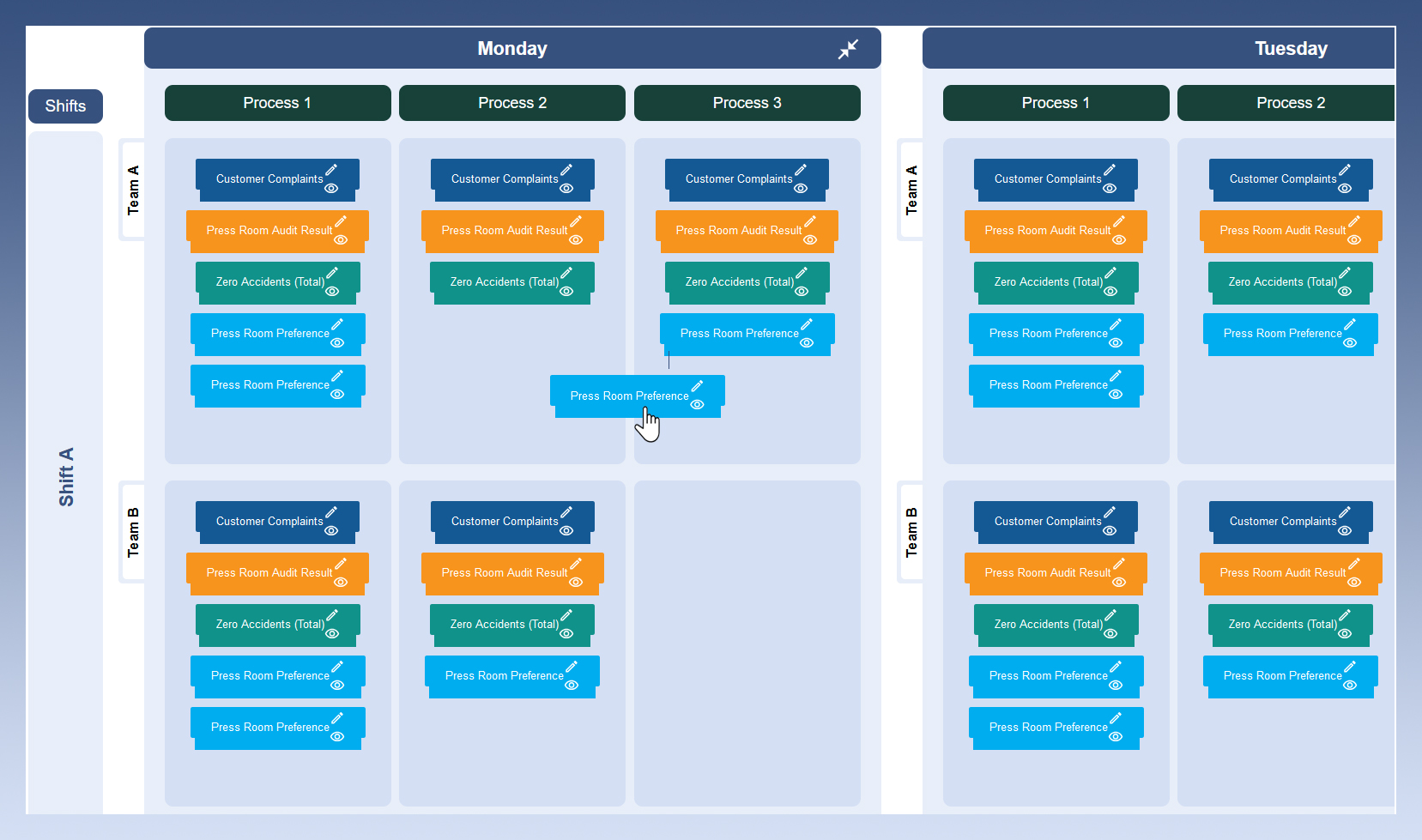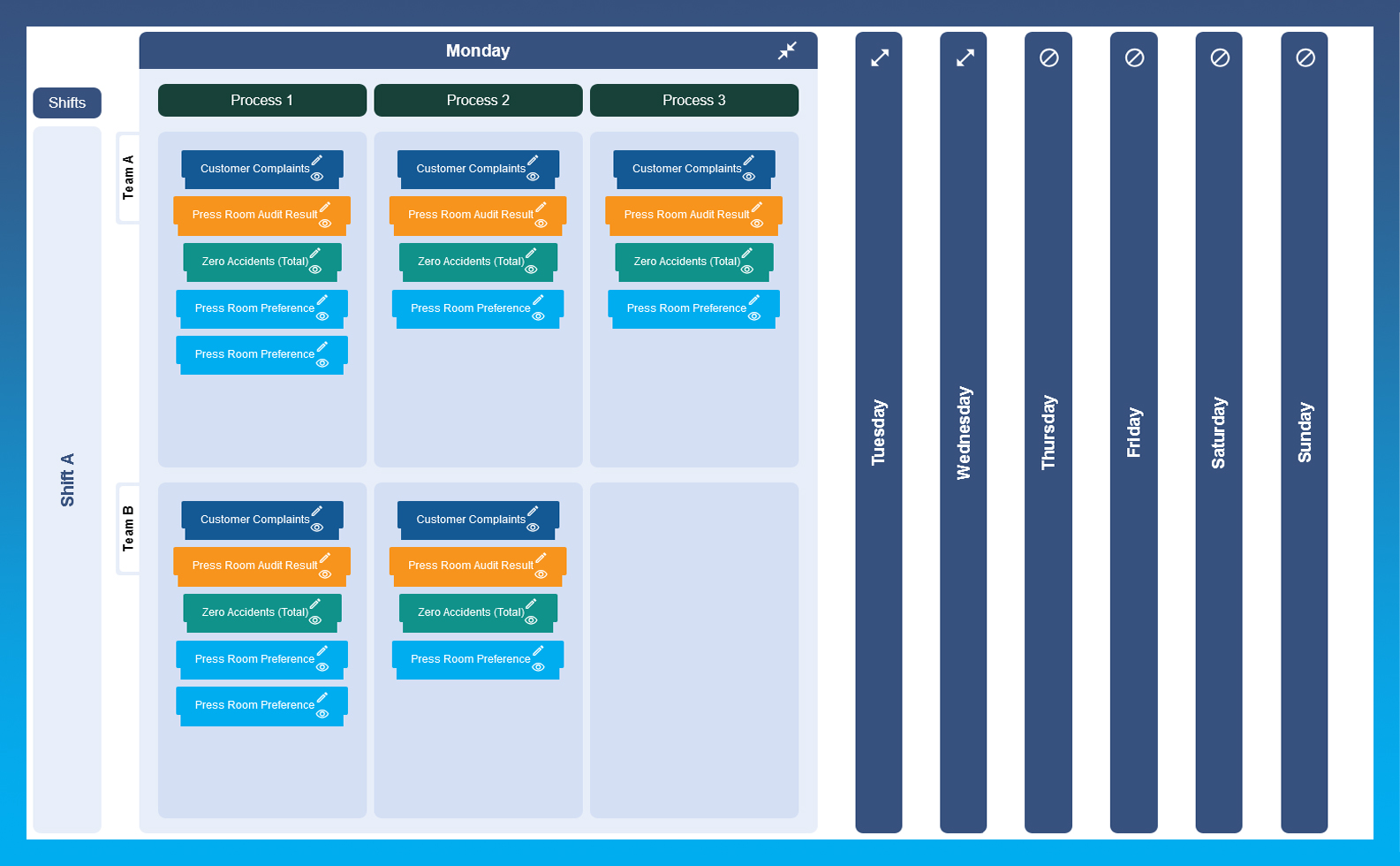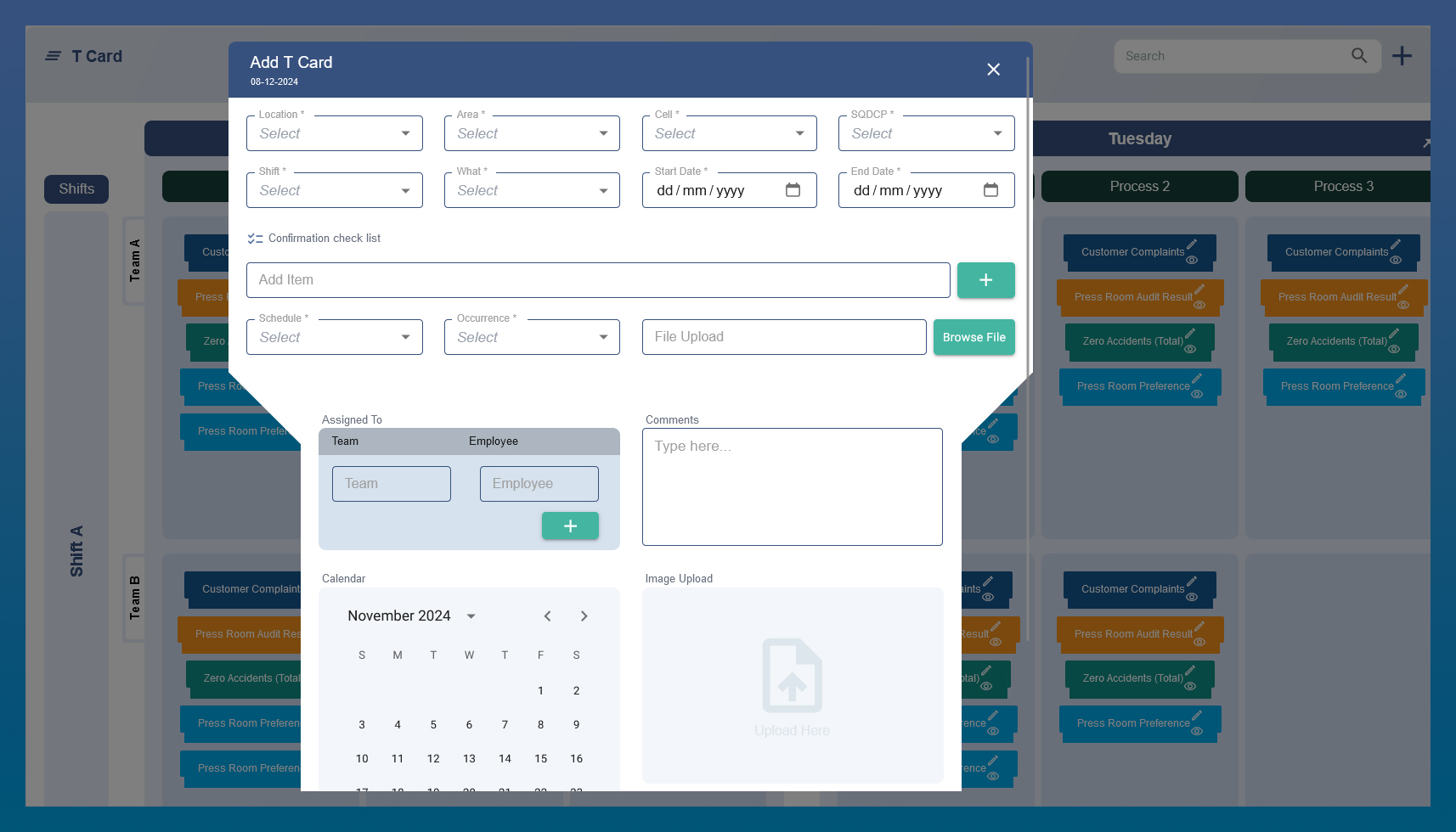What is a TCard system?
A TCard system is a visual task management tool that helps track and manage tasks by using cards, each representing a specific task or process, and placing them on a board to reflect their status in a workflow.

How does a TCard system work?
The system organizes tasks into columns on a TCard board, with each card containing details about a task. As tasks progress, the cards are moved through the different stages of the workflow.
What is a TCard board?
A TCard board is a surface (physical or digital) where the TCards are placed. It typically has columns to represent stages in the task workflow.
What are TCard holders?
TCard holders are slots or spaces on the TCard board where the cards are placed. They keep the cards in place and make it easier to view and update task progress.
Can TCard systems be used digitally?
Yes, TCard systems can be used digitally, with virtual boards and cards that can be updated in real time. These systems often offer additional features such as analytics and notifications.

What industries use TCard systems?
TCard systems are used across various industries, including manufacturing, healthcare, logistics, education, and office management, to track tasks, improve workflow, and enhance productivity.
What are the advantages of using a TCard system?
The key advantages include improved task visibility, better workflow organization, easier collaboration, and enhanced accountability among team members.
Can I customize the TCards?
Yes, most TCard systems allow you to customize the cards in terms of size, color, and content to fit your specific task management needs.
How do TCard systems improve task management?
TCard systems provide a clear visual representation of tasks, enabling better tracking, prioritization, and communication across teams.
Can a TCard system track multiple tasks?
Yes, TCard systems can manage and track multiple tasks at once, especially when digital tools are used to categorize and organize tasks by project or priority.
Can TCard systems handle recurring tasks?
Yes, recurring tasks can be easily managed and scheduled within the system, with automatic reminders or actions depending on the setup.

How secure are web-based TCard systems?
Reputable web-based TCard systems implement encryption and secure servers to protect your data, ensuring privacy and compliance with security standards.
Can TCard systems integrate with other tools?
Yes, many TCard systems support integration with tools like project management software, CRM platforms, and ERP systems to streamline workflows across platforms.
What is a web-based TCard system?
A web-based TCard system is an online tool that allows users to manage tasks digitally using a virtual board, accessible from anywhere with internet access.
How does a TCard system help with team collaboration?
The system centralizes task tracking, allowing team members to view and update tasks in real time, promoting transparency and improving communication.
What are the materials used for physical TCard boards?
Physical TCard boards are typically made of durable materials such as metal, plastic, or cardboard, designed to withstand regular use and facilitate easy card manipulation.
Can TCard systems be used for inventory management?
Yes, TCard systems are highly effective for inventory management, allowing you to track stock levels, manage orders, and visualize inventory flow in real time.
Can TCard systems handle time-sensitive tasks?
Yes, the system supports visual cues and deadlines to help manage time-sensitive tasks, ensuring timely completion and improved productivity.
How do I maintain a physical TCard system?
To maintain a physical TCard system, regularly update the cards, ensure the board is clean, and replace or repair any damaged parts.
What is the cost of using a TCard system?
The cost of a TCard system depends on whether it's physical or digital. Digital systems may have subscription fees based on features or user count, while physical systems involve the cost of materials and setup.
Can I track task dependencies with a TCard system?
Yes, digital TCard systems allow you to visualize and track task dependencies, helping you identify and manage related tasks more effectively.
Can a TCard system support Agile project management?
Yes, TCard systems are compatible with Agile methodologies, offering a visual and iterative approach that aligns with the principles of Agile project management.
How do I implement a TCard system in my organization?
To implement a TCard system, define your workflow stages, set up your TCard board, and customize the cards to suit your organization's task management needs.
What kind of support is available for TCard systems?
Support options for TCard systems typically include customer service, tutorials, FAQs, and sometimes training sessions to help users get the most out of the system.
Are there any alternatives to TCard systems?
Yes, there are alternative task management tools such as Kanban boards, Gantt charts, and project management software, but TCard systems are favored for their simplicity and ease of use.
What is a TCard's role in team accountability?
A TCard system enhances accountability by making tasks and their statuses visible to the entire team, ensuring everyone knows what’s expected and when tasks are due.
Can I use a TCard system for personal task management?
Yes, TCard systems are versatile and can be used for personal task management, providing a clear, visual way to track and prioritize your daily tasks.
How do I organize TCards on a board?
You can organize TCards by stages such as "To Do," "In Progress," and "Completed." You may also use columns to represent priorities, categories, or specific projects.
Can TCard systems handle large teams?
Yes, TCard systems are scalable and can handle teams of various sizes. Digital systems allow for real-time collaboration, making them ideal for large teams.
Is it possible to share a TCard board with others?
Yes, digital TCard systems often include sharing and collaboration features, allowing you to invite others to view or edit the board in real-time.
What happens when a task is completed in a TCard system?
Once a task is completed, the corresponding TCard is moved to the "Completed" column or stage on the board, providing a clear visual representation of progress.
Can TCard systems integrate with email notifications?
Yes, many digital TCard systems integrate with email notification features, alerting users when tasks are due, updated, or completed.
Can I color-code TCards?
Yes, most TCard systems allow for color-coding of cards to represent different priorities, types of tasks, or statuses for better visual management.
Are physical TCard boards still effective?
Yes, physical TCard boards are still effective for in-person task management, especially in small teams or environments where digital tools are not feasible.
How do I move tasks across stages in a TCard system?
In a digital TCard system, tasks are moved by dragging and dropping the cards between columns or stages. For physical boards, cards can be manually repositioned.
Can TCard systems track time for tasks?
Yes, many TCard systems offer time tracking features, allowing you to monitor the time spent on tasks and improve scheduling efficiency.
Can TCard systems help with workflow analysis?
Yes, digital TCard systems often include analytics tools that allow you to review task performance, bottlenecks, and team productivity over time.
How do I prioritize tasks in a TCard system?
Tasks can be prioritized in a TCard system by labeling, color-coding, or placing them in specific columns such as "High Priority" or "Urgent."
What is the difference between TCard systems and Kanban boards?
While both are visual task management tools, TCard systems focus on physical cards that can be placed on boards, whereas Kanban boards often use digital tools to display and manage tasks in a similar workflow.
Can I set deadlines on TCards?
Yes, TCards can include due dates and deadlines to help ensure tasks are completed on time. Many digital systems allow you to set reminders for these deadlines.
How do I add details to a TCard?
You can add details such as descriptions, assignees, due dates, and attachments to each TCard, providing all relevant information for task completion.
Can a TCard system improve team productivity?
Yes, by providing clear visibility and accountability for tasks, TCard systems can enhance communication and keep teams aligned, leading to improved productivity.
What is the role of TCard boards in visual management?
TCard boards are central to visual management, providing a clear and intuitive way to track tasks and workflow, which helps teams prioritize and complete work more efficiently.
How do I use a TCard system for project tracking?
You can use TCard systems by breaking down your project into tasks, assigning them to team members, and moving them through stages to track progress and ensure deadlines are met.
Can I manage multiple projects on a TCard board?
Yes, you can set up different columns or boards for each project and track multiple projects simultaneously within the TCard system.
What are the best practices for using a TCard system?
Best practices include regularly updating the cards, keeping tasks organized by priority, using color-coding for easier identification, and involving the whole team in the process.
Can TCard systems help with meeting deadlines?
Yes, by providing a visual representation of tasks and deadlines, TCard systems help ensure that tasks are completed on time and avoid missing deadlines.
How do I track task completion on a TCard board?
Tasks can be marked as "Completed" by moving their TCard to a designated column or by changing its status digitally in an online TCard system.
How can TCard systems help with accountability in a team?
By clearly displaying who is responsible for each task and showing progress, TCard systems help ensure that everyone is accountable for their work.
Can TCard systems be customized for different workflows?
Yes, TCard systems can be customized with different columns, categories, and labels to match various workflows and business processes.